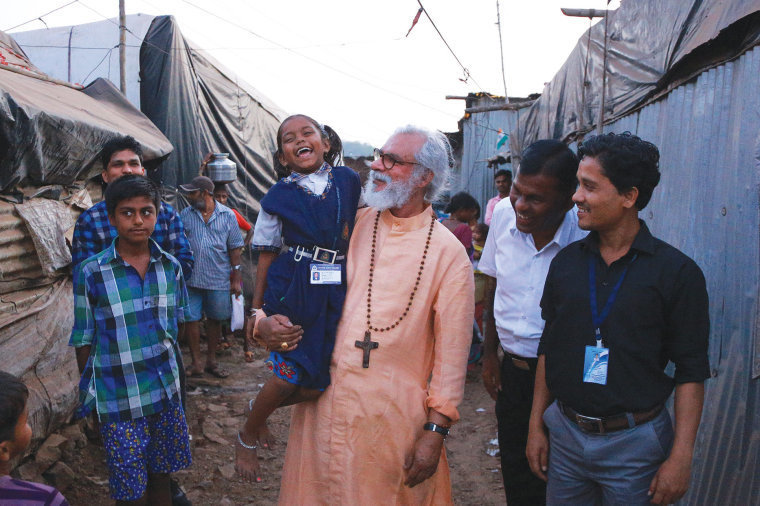On the funeral service of Kadapilaril Punnoose Yohannan or K.P. Yohannan, the visionary founder of Gospel for Asia (GFA World) and the Metropolitan of Believers Eastern Church on May 21, 2024, Christian Today spoke to Dr. Saphir Athyal, a close associate of Yohannan also referred to by the church as Athanasius Yohan I.
Ninety-four-year-old Dr. Athyal had known Yohannan, whom he refers to as KP, for 40 years. Athyal did his doctorate from Princeton University and became the first national doctor in the Old Testament in India. He was not only a friend and a neighbour to Yohannan (who lived a short distance from his house) but also “his (Yohannan’s) mentor” as Yohannan introduced him in one of his meetings.
Christian Today had an interview with Dr. Athyal:
Q. What is that one thing that you would like to remember Dr. Yohannan for?
Athyal – It amazes me how such a lowly person came up to where he was now. He had a supreme vision all the time and his vision was the driving force in his life. Just like the five loaves and two fishes, God took the small things from KP’s hands and multiplied to make it this gigantic. Despite all the success, KP was very humble.
Q. Can you highlight any five things Dr. Yohannan did in a unique way in his ministry that the world should remember him for?
Athyal –
1. Passion for Evangelism: Evangelism was the foremost thing in his mind. In whatever he did, reaching out to people was the passion burning inside him always. Though his messages don’t come under the ‘unique’ category, but they were very powerful tool that made his mission very successful. He wanted to train the local people in their local language, so that they may further reach their own people. That is the only method to evangelize in India. Not everybody from other parts of India or the world can come and evangelize in the unique cultural setting of a village which not only has cultural barriers but language barriers as well. KP had started training program in all the states of India and Southern Asia. That was the secret behind the growth of KP’s churches in the last few decades. His combined church membership grew to three-and-a-half million people, turning his church into one of the largest churches in South Asia. This very rapid growth of Believers Eastern Church was because local people were trained and evangelised to their own people. In my opinion what the Metropolitan did was a miracle in the history of Christian missions in India.
2. Wholistic Mission: KP’s mission was a wholistic mission. Just like what Jesus did – Jesus healed people, fed people, and shared the message of salvation with the poorest people at the same time. KP’s approach was also the same. He established a hospital in Thiruvalla, Kerala has become one of the best and largest medical college and hospital in Kerala. KP told me that he was establishing the hospital to provide employment for the poor people and to treat them. He had started High Schools, Orphanages, Destitute Homes in many states of India. It was this wholistic approach of wholly meeting the needs of a person, that stood out in him.
3. Combining Classical Liturgy and Church Traditions with a very clear evangelical biblical faith: Coming from a charismatic background and then the Church of South India background, he became liturgic. People criticised him for being so, but I have no problem with the outside form being more liturgical and traditional, provided some of their teachings are not followed – like the prayers to Mary, prayers to the dead, prayers through the saints. The Believers Church follows and is rooted in the belief of being born-again, having faith, accepting Christ as their personal Saviour. At the same time, he is combining these two. I find great value in symbolism like wearing Bishop’s robes, hats, rings, etc., especially when Believer’s church works among illiterate people and such people learn from symbolisms. They cannot read and write, but symbolism leaves a deep impact on them. KP somehow balanced these two – the classical church traditions and standing strong on the basic evangelical biblical faith.
4. Extremely good at developing relations: He had a good relationship with the elite in our society – Indian political leaders, chief ministers, police officers and at the same time he related so well with the poorest people. He was able to relate with all the different strata of the society.
5. Affective Communication and the poorest could identify with him: One day I was traveling in a taxi, and that taxi driver stopped on the way with my permission to drink a cup of tea. But he did not return for more than 30 minutes. When he did, I asked him ‘how was the tea?’ and he responded that he was not only there for tea, but it was time for K.P. Yohannan’s message to be broadcasted on radio, and he was away listening to it. I asked the driver the reason for him to be eager for KP’s message while there are so many other Christian messages also on the radio. He said, “He speaks our language.” KP spoke the language of the lowest and ordinary people and they loved him.
Q. What are your final words?
Seventy-four years of life, from nothing at all to establishing a church that is very powerful and growing fast – primarily in South Asia, Africa, and other countries, is nothing but God’s miracle. KP’s death is a big loss to the Christian missions.

